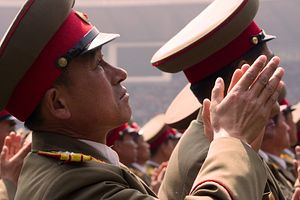Two musical groups from North Korea – the State Merited Chorus and the Moranbong Band – cancelled scheduled performances in Beijing from December 12-14, hours before they were scheduled to take the stage. According to Xinhua, the performances “cannot be staged as scheduled due to communication issues at the working level.”
Both groups perform music extolling the North Korean state and its leadership. The State Merited Chorus is a traditional military band, performing in full uniform. The Moranbong Band, however, is North Korean propaganda music with a modern twist – the all-female band, whose members are reportedly hand-picked by Kim Jong-un himself, is Pyongyang’s answer to the ubiquitous K-Pop of South Korea. Their scheduled performance at the National Center for Performing Arts in Beijing would have been their first overseas show.
It’s unclear why the performances were cancelled, especially as they were given official sanctioning only a few days earlier. Xinhua reports that the two musical groups were seen off at a North Korean train stations by Kim Ki-nam, the secretary of the Central Committee of the Korean Workers’ Party, Cultural Minister Pak Chun-nam, and China’s ambassador to North Korea, Li Jinjun. Coming a few months after North Korea and China exchanged high-level visits – KWP Secretary Choe Ryong-hae visited Beijing for a military parade in September, while Chinese Politburo Standing Committee member Liu Yunshan went to Pyongyang for the 70th anniversary of the KWP’s founding – the musical performances were seen as a goodwill tour to cement gains in China-North Korea ties.
How that fell apart remains a mystery. South Korea’s Yonhap News Agency offered some theories from the National Intelligence Service. NIS reportedly told South Korean legislators that Beijing may have been “uneasy about a performance full of propaganda extolling leader Kim Jong-un,” Yonhap said. NIS also said that Pyongyang may have been upset about the low rank of Chinese officials sent to attend the performance and greet the groups.
Whatever the reason for the cancellation, Yonhap cited sources who observed a flurry of last-minute diplomacy at the hotel where the North Korea groups were saying. “To my knowledge, the Chinese officials had persuaded North Korea to go ahead with the performance as scheduled… But North Korea eventually called off the performance,” a source told Yonhap.
Chinese Foreign Ministry spokesperson Hong Lei refused to add any additional information to the Xinhua report on the cancelled shows (in part because, as spokesperson Hua Chunying pointed out last week, “The goodwill visit and performance of the DPRK art groups in China are not within the remit of the Foreign Ministry”). Hong insisted, however, that “China pays great attention to cultural exchanges with North Korea.” China is “willing along with North Korea to keeping pushing cooperation forward on all levels, including cultural exchanges,” Hong said.
Meanwhile, North Korea pulled news articles and photos promoting the Beijing performances from its websites, which had prominently featured the story last week. Pyongyang’s Korean Central New Agency had previously said that the concerts would contribute to “deepening friendship” between China and North Korea.
The cancellation of a musical performance isn’t a serious long-term setback for China-North Korea relations, but it does symbolize the current state of ties. That is to say, the canceled performances should be viewed as an effect, not a cause, of tensions. A stable partnership between China and North Korea wouldn’t lead to a goodwill cultural performance series being called off due to “communication issues.” Despite the visits exchanged by Choe and Liu, Beijing and Pyongyang have more work to do to get their relationship back on track.

































